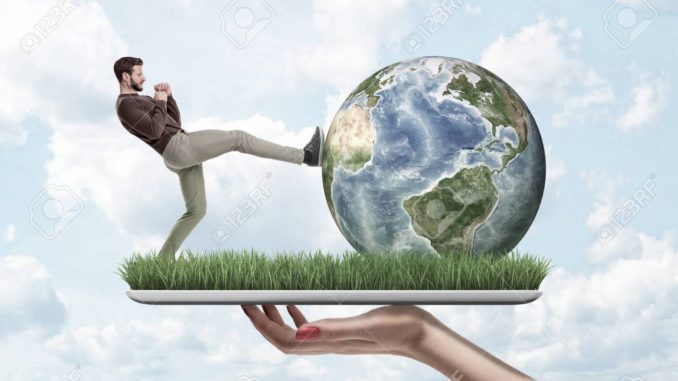
As a human race we have done very well in the last century. It has seen a global economic boom on a scale never experienced before. According to the IMF paper titled, “The world economy in the 20th century: Striking developments and policy lessons’ world GDP at constant prices increased 19 fold between 1900 and 2000, corresponding to an average annual growth rate of 3%. Then come the realisation that each of the miracle technologies that have enhanced living standards have major downsides. Their use leaves footprints that seem small at first but add up to making the world difficult place to live in. Access to water has become easy for so many that its use has become indiscriminate and there is little effort to reuse the resource. The inherent assumption in all of this seems to be that the capacity of nature to allow human beings to do what they want to do is unlimited.
Sadly, we’ve now learnt this is not the case. unless we adopt ways to live in harmony with nature and find ways to undo at least some of the damage already done, human habitation on earth is under severe threat.
In the last few years the message has hit home. A pan-India survey commissioned by the Mahindra Group this year revealed that four out of five Indians are aware of the impact of their actions on nature and climate change. 83% expressed ‘interest’ in making life style changes such as carpooling, using public transport, or electric vehicles; 70% claimed to be informed about the environmental issue of water conservation. Such awareness and good intentions are not, however, matched by actual behaviour.
Although the number of individuals willing to purchase green products and lead a greener life has increased a lot in the last few years, there is little evidence to suggest that purchase of green products has increased by much. Despite concern for the environment and a positive attitude of people towards sustainability and green products, only a quarter of the respondents are able to find suitable alternatives that help them lead a greener life.
88% of the respondents believe that it is the lack of affordable eco-friendly alternatives that prevents them being more environmentally considerate in their daily lives. 89% believe that they would be able to address climate change more actively if companies offered alternative solutions to adopt.
The ball is in the court of corporations. The report reveals that the biggest barrier to sustainability is no longer consumer awareness attitudes. This is what makes sustainability the biggest business opportunity for this generation. In 2017, The Business and Sustainable Development Commission stated in a report ‘Better business, Better world’, that sustainable business models could open economic opportunities worth up to $12 trillion and increase employment by up to 380 million jobs by 2030.
This huge opportunity cannot be accessed without innovation. We have a chance to literally reshape the way we do things- the way we travel, the way we live, the way we eat, the way we work, et al. It’s almost like rebooting the world, only we have to do it while the world is alive and kicking.
We want a vibrant ecosystem that has developed over centuries to turn on a dime and suddenly take on a new avatar. This is what makes the potential transformation all the more challenging. Yet the opportunity cannot be ignored. Imagine a world where we live in building that grow food, travel in modules that guide themselves while talking to other similar modules, use materials that have been recycled and are smart, use lights that transmit data, get our devices charged by walking into designated areas, have things delivered to us using drones, access an endless reservoir of responsibly used water, sail on oceans that have no plastic in them. The only thing that prevents these seemingly utopian possibilities from happening is a focused effort by corporations to create solutions that help make life convenient and are environment friendly.
Innovations must happen now if we are to prevent catastrophic impact on human lives. Little children are fascinated by airplanes in the sky, the day is not faraway when their fascination will be triggered by drones in a clear blue sky. The ball is in our court. Individual actions matter.
Matter referenced:
Times of India, Ahmedabad, Tuesday, 24th December, 2019.
By: Dr. Bhawana Asnani.
Happy to see Reviews, Additions, Suggestions and Comments, further.

Great content! Super high-quality! Keep it up!